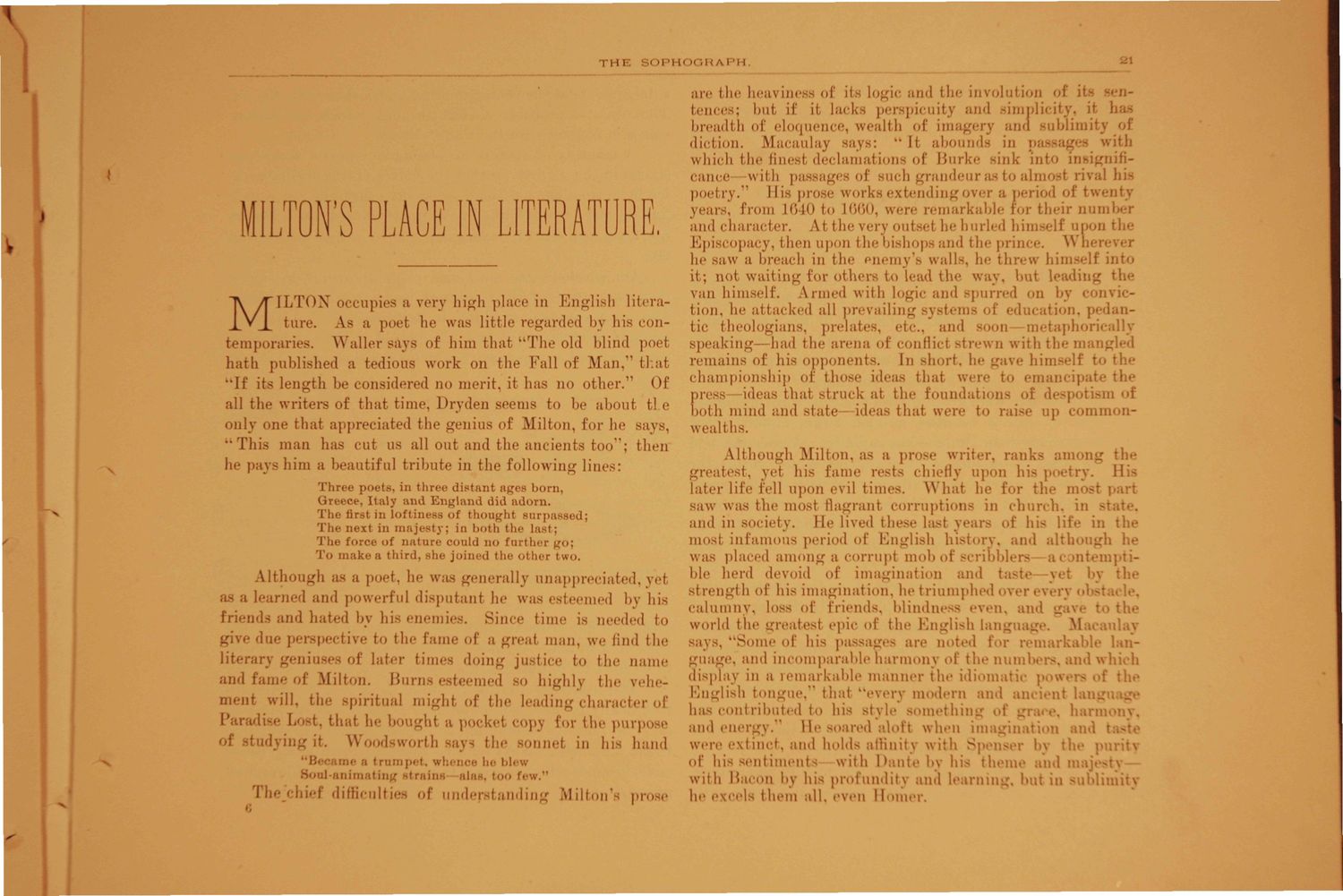Caption: Sophograph - 1890
This is a reduced-resolution page image for fast online browsing.

EXTRACTED TEXT FROM PAGE:
Tin "Pi < icnAi'ii. are the heaviness of its logic and the involution of its fenccs; but if if lacks p e r s p i c u i t y and -implicj . it nhi MILTON'S PLACE IN LITERATURE ILTON occupies a very high place in English literature. As a poet he was little regarded by his contemporaries. Waller savs of him that "The old blind poet hath published a tedious work on the Fall of -.Man." that "If its length be considered no merit, it has no other." Of all the writers of that time, Dryden seems to be about t! e only one that appreciated the genius of Milton, for he savs. "This man has cut us all out and the ancients too"; then he pai him a beautiful tribute in the following lines: Th poets, in three distant ages born. Greece, Italy and England did adorn. The first in loftin< of thought surpassed; The next in majesty; in both the last: T h e force <>f n a t u r e c o u l d n o f u r t h e r x<>; T o m a k e a t h i r d , she joined the other two. M breadth of eloquence, wealth of imagery and Bublimi t diction. Macaulay •••-•: " I t abounds in passag i which the finest declamations of Burke nk into insignificance with passages of such grandeur J lm ! hi poetry." Bis prose works extending over a period of years, from L640 to L60O, were remarkabl For their num r and character. At the very outset he hurled him f upoi Episcopacy, then upon the oishope ad the prince. Wh( r he saw a breach in the enemy's walls, he threw him in it; not waiting for others to lead the way. but rig tm van himself. Armed with logic and spurred on by conviction, he attacked all prevailing systems ol education, } tic theologians, prelates, etc., and > n aphorically speaking—had the arena of conflicl strewn with tl remains of his opponents. In short, he gave himself I he championship ot those ideas that were to emai pal p r e s s — i d e a s t h a t s t r u c k at t h e f o u n d a t i o n s of < m both mind and state—ideas that were to raise up wealths. immon- A l t h o u g h as a poet, he was g e n e r a l l y u n a p p r e c i a t e d . vet 3 a l e a r n e d and p o w e r f u l d i s p u t a n t lie was esteemed bv his friends and hated by his enemies. Since time is needed to give due perspective t > the fame of a greai man. we find (he < literary gen in of later times doing justice to the name and fame of .Milton. Barns esteemed so highly the vehement will, the spiritual might of the leading character of Pai iise Lost, that he bought a pockel copy for the purp< ol tidying if. Woodsworth the nnel in his band "B i t mm pet, wl riimatiii; trains Although Milton, as a prose writer, ranks among tfc greatest, yet his fame r- s chiefly upon his] ry. H later life fell upon evil times. What he for the n saw was the most flagrant corruptions in church, in and in society. Be lived these last years of his life in tl most infamous period of English history, and alth was placed among a corrupt mobof riDblers— n\ ble herd devoid of imagination and ta j he strengl h of his imaginat ion, he I riumphed ry calumny, loss of friends, blindn« >ven, and gii\ world the greatest epi< A the English langun M savs. "Some of his pa are m d for markal language, and incomparable harmony of tl mi nd n display in a remarkable manner the idion f tl English tongue." thai "every modern and has contributed to bis Btyle mething o\ i . harm< and energy." rle soared lofl when ini :in I tasi wen- exi inc. and hold ithllil ) fl ith Sp ' \\ of his s e n t i m e n t w h D a n t e by b with Bacon bv bis profundity and I rn he excels t h e m all. even 1 I n n e r , ie be blew all Tin biei lifficulties of understanding Milton's pr< m« 1 ma; :. but in -
|